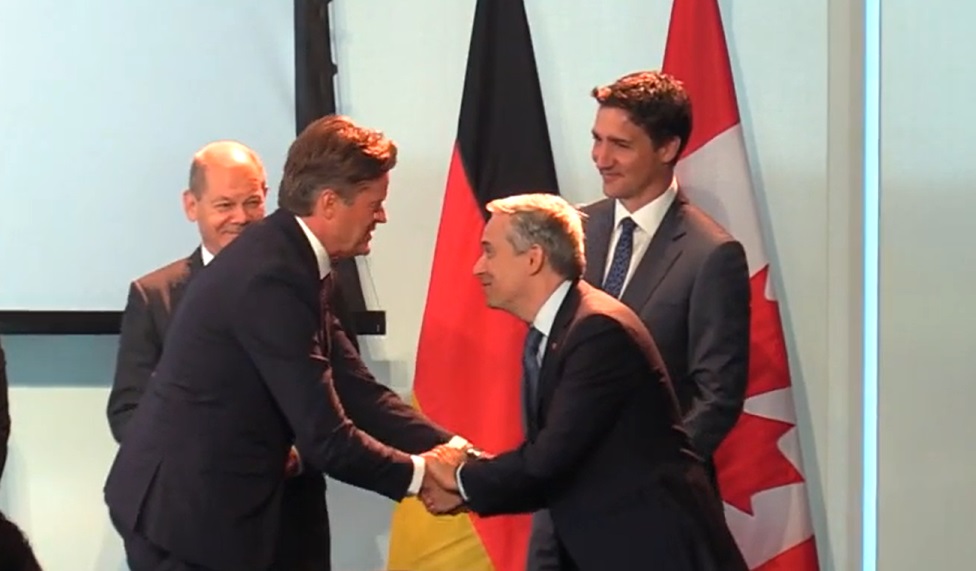Canada Signs EV and Battery Supply Chain Agreements with Volkswagen, Mercedes-Benz

The Government of Canada announced the signing of new agreements with German automakers Mercedes-Benz and Volkswagen, aimed at enhancing collaboration and promoting investments in electric vehicle (EV) and battery supply chains and manufacturing in the country.
The announcements come as automakers around the world are allocating billions of dollars to ramp their electric vehicle manufacturing capacity, and are looking to establish global supply chains for EV production, and to source the raw materials needed for mass EV production. Mercedes-Benz, for example, announced plans last year to invest over €40 billion through 2030 in a bid to go all-electric, and Volkswagen has committed to have at least 70% of its unit sales in Europe be all-electric vehicles by 2030, and aims to fully electrify its new vehicle fleet.
Mercedes-Benz Chief Technology Officer Markus Schäfer said:
“To scale up our electric vehicle production, direct access to primary sources of raw materials is needed to improve the resilience and sustainability of the electric vehicle supply chain. Thanks to our memorandum of understanding with Canada, Mercedes-Benz has a strong and capable partner to break new ground for a new era of sustainable transformation in the automotive industry.”
The new Memorandum of Understanding (MoU) with Mercedes-Benz is focused on enhancing collaboration with Canadian companies along the electric vehicle and battery supply chains, supporting the development of a sustainable critical mineral supply chain in Canada based on ESGEnvironmental, social, and governance (ESG) criteria are a set of standards for a company’s operations that socially conscious investors use to screen potential investments. More principles, collaborating on R&D and identifying potential investments in Canada.
Mercedes also said that it is exploring an agreement with Canadian cleantech company Rock Tech Lithium to up to 10,000 tonnes of lithium hydroxide annually. According to the company, the agreement would mark “a decisive step for the supply of high-quality lithium to be processed in Germany.”
Under the MoU with Volkswagen, the parties will investigate opportunities for Canada to contribute to Volkswagen’s global and regional battery supply chains, and deepen cooperation on sustainable battery manufacturing, cathode active material production and critical mineral supply. Additionally, Volkswagen’s newly established battery company PowerCo will set up a new Canadian office.
Volkswagen CEO Dr. Herbert Diess said:
“Working hand in hand with governments around the world is an absolute prerequisite to meet our climate goals, and I want to thank the Canadian government for its support. The supply of battery raw materials and the production of precursor and cathode materials with a low carbon footprint will allow for a fast and sustainable ramp-up of battery capacity—a key lever for our growth strategy in North America.“
The agreements follow the launch earlier this year of Canada’s 2030 Emissions Reduction Plan, the from carbon pricing and clean energy expansion, to carbon capture development and zero emissions vehicle incentives. Canada introduced a goal to cut GHG emissions by 40% – 45% by 2030 last year, forming the first main step in the country’s pledge to reach net zero emissions by 2050.
The Canadian 2030 strategy includes plans to introduce a sales mandate ensuring that at least 20% of new light vehicle sales will be zero emissions vehicles by 2026, followed by 60% by 2030 and 100% by 2035.
Canada also announced plans this year to implement a Critical Minerals Strategy, aimed at developing critical mineral resources and value chains needed to power the green and digital transitions. Key battery, EV and cleantech-related materials highlighted include lithium, graphite, nickel, copper and cobalt, along with rare-earth elements.
According to a Government of Canada statement announcing the MoU’s, the new agreements will “help secure Canada’s position as a leading centre of excellence for the manufacturing of electric vehicles and batteries and help ensure that Canada is a destination for investments in this space.”
Canada’s Minister of Innovation, Science and Industry, François-Philippe Champagne said:
“Canada is quickly becoming the green supplier of choice for major auto companies, including leading European manufacturers, as we transition to a cleaner, greener future. By partnering with Volkswagen and Mercedes, Canada is strengthening its leadership role as a world-class automotive innovation ecosystem for clean transportation solutions.”
The post Canada Signs EV and Battery Supply Chain Agreements with Volkswagen, Mercedes-Benz appeared first on ESG Today.